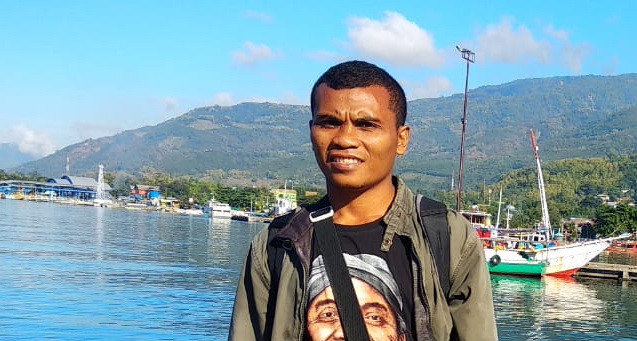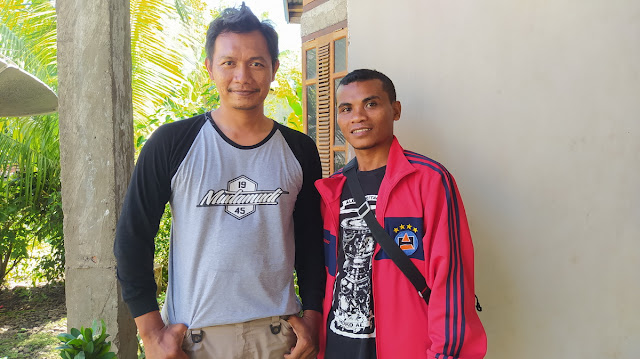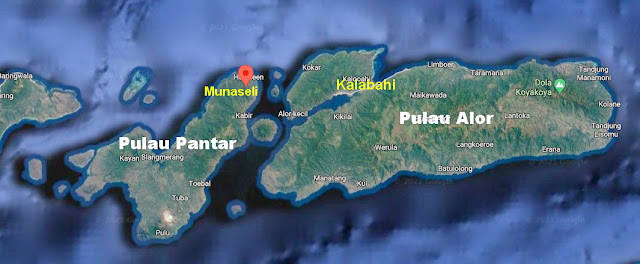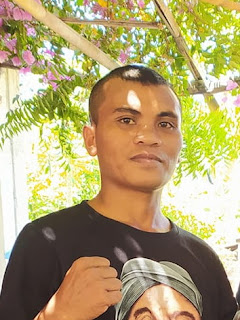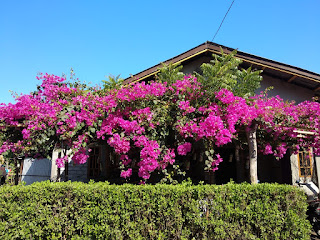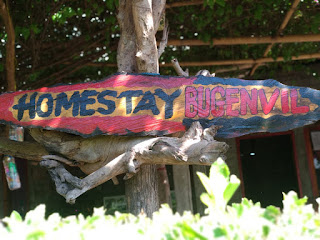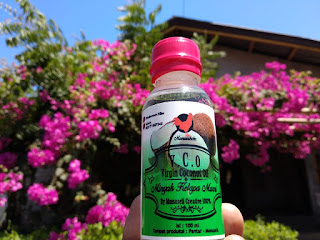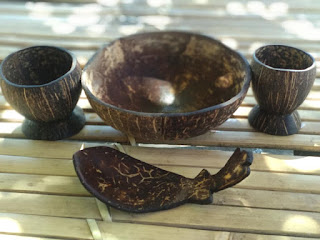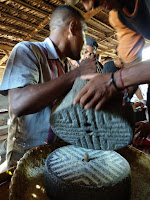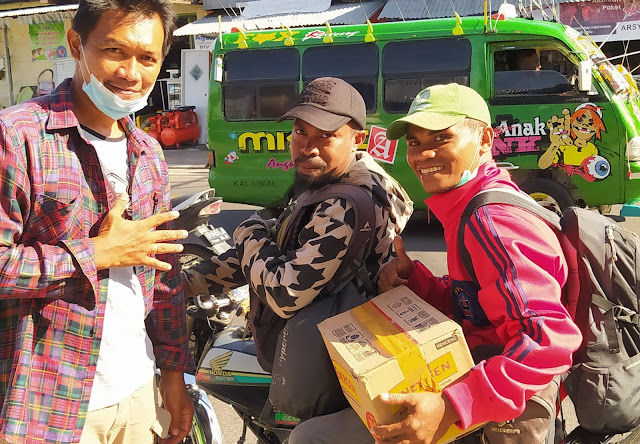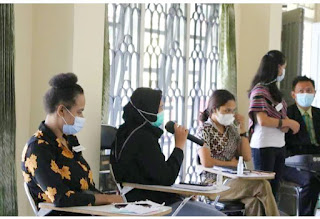Ruben Sonhibu, a Young Initiator from Munaseli
Wednesday, 5 May 2021by Trustha Rembaka
Developing village-based ecotourism
By Trustha Rembaka
An interesting topic at this time is discussing the role of young people in their participation to develop the village. The existence of young people who have 'heart' for their village or hometown is a blessing and should be supported, even though the struggle is not easy because there are various challenges and situations. But it does not mean to discourage young people to start, instead to encourage more to find strategies to 'break' the barriers calmly and smartly.
The involvement of young people who are struggling to develop their village could also be found in Alor, precisely in Munaseli on the island of Pantar. He is Ruben Sonhibu, a young man who has a high spirit, took initiative to develop his hometown, slowly but sure he is moving forward and developing. Ruben's motivation, passion, and experience are revealed in this interview below.
“First of all, can Ruben introduce yourself, where you are from, what your educational background is, and what activities you are currently doing?”
Ruben: I am Ruben Sonhibu, bachelor of Animal husbandry, from Munaseli village, Pantar district, Alor regency, East Nusa Tenggara province. I have graduated from Nusa Cendana University Kupang, majoring in Animal Husbandry. Currently, my activity is working as an entrepreneur, especially a social and tourism entrepreneur in Munaseli.
“What does the situation look like in Munaseli, Ruben's hometown?”
Ruben: The general view of Munaseli is related to the traditional people and their traditional lives, such as the way of life, farming, and trading, in this case bartering goods. In terms of preserving culture, nature, the environment is still well maintained, even though seasonally, in the dry season it is dry. However, community relations and tolerance between religious communities are still well maintained until now. Also, the hospitality of the people in the village is still very high.
“Why is Ruben interested in developing a tourist village in Munaseli? What was the initial idea?”
Ruben: I am interested in developing village-based ecotourism in Munaseli because I see natural, cultural, and marine potencies that are still natural, not managed properly to be productive and beneficial for the community. Therefore, I think this is a great opportunity for people's lives in the future. From there the idea came to pioneer village-based ecotourism.
The idea started when I was elected as chairman of Village Enterprise, Manusirikoko Munaseli. From this point, I and my friends opened a cooperative relationship with several Independent Non-Governmental Organizations (NGOs) in Alor regency to support our ideas, as well as assist in pioneering village-based ecotourism and together with the Village Enterprise team to map the potencies in the village.
“What kind of strategy did Ruben use to start the community involvement? What are the challenges of the situation in Munaseli?
Ruben: The strategy that I carried out with my friends was approaching the traditional elders to build an ecotourism village, such as collecting stories about the Munaseli kingdom, restoring the original heritage sites with the traditional elders in the village. The real challenge is the quality of human resources, which is still limited and the awareness of young people in the village has not yet emerged to build village-based ecotourism. With the local people, we work together to prepare traditional tools and ways of life.
“Can you tell us the key to develop Munaseli village?”
Ruben: the key to develop Munaseli is good cooperation between Village Enterprise, village government, religious leaders, traditional elders, and the community in Munaseli village, based on the spirit of work and willingness to make changes for a better village.
“What is the flagship or interesting thing in Munaseli?”
Ruben: Munaseli has a wealth of unique tourism and strong traditional Pantar culture. Munaseli has nature, culture, and underwater potencies that are still natural. Tourists who come to Munaseli will learn about the history of the Munaseli kingdom, a collection of traditional tools such as coconut peelers and graters, corn or rice grinders and how to use them, traditional farming activities, or marine tourism whether swimming or diving to see coral reefs and during the market day, everyone may go shopping in the market by barter system.
This is the evidence when young people have the enthusiasm to take action and to get the opportunity to do it, then good changes will occur and bring hope for the community development, especially in the village. Hopefully, this interview will inspire young people across the country to be independent, creative and make positive movements for their hometown.***
Analyzing the Practice of Democracy in Indonesia
Sunday, 2 May 2021by Thomas Yulianto
By Thomas Yulianto
Having held the first two discussions, Stube HEMAT continued to learn more on democracy in the 3rd discussion on Saturday, May 1, 2021, at Wisma Pojok Indah, Condongcatur, Yogyakarta with a theme "Analyzing the Practices and Strategies of Democracy in Indonesia". The resource persons invited in this third discussion were Dr. Budiawan, a lecturer at Graduate School of Gadjah Mada University, Yogyakarta and George B.L Panggabean as a practitioner and former politician.
The event started at 09:30 WIB led by Daniel Prasdika and Kresensia Risna Efrieno as master of ceremony. At the beginning of this discussion, Putri Laoli as the moderator asked a question, "What do you know about democracy?" According to Ari Gunawan as a participant, he expressed his opinion, "Democracy comes from the words ‘Demos’ and ‘Kratos' which mean the highest power is in the hands of the people, and everything returns to the people themselves."
Dr. Budiawan explained material about the history of democracy starting from the independence of the Republic of Indonesia (1945-1949), the Republic of the United States of Indonesia (1949-1950), the RIS Constitution into the provisional constitution (1950-1959), Guided Democracy (1959-1966), the New Order Era (1966) -1998), and the Reformation Era (1998-present). At the end of the presentation, Dr. Budiawan concluded that the year 1998 up to now there is a euphoria of democracy, freedom in a democracy is glorified, and even tends to be 'going too far.' George B.L Panggabean explained several materials which is related to the experiences he had in the past, “Democracy cannot be separated from a developing culture, the cultures possibly ‘color’ the growth of democracy. The characteristics of democracy are people, deliberation, and human rights."
Based on the material presented by these two resource persons, it sparked Ari Surida's curiosity about the material presented by Dr. Budiawan about the meaning of ‘the democracy is going too far.' Dr. Budiawan clarified his statement that democracy is called excessive because there are parameters that are used, such as the legislation. So if it is not fit the regulations, it is called excessive. According to George B.L Panggabean, the current democracy has shifted from its paths, such as the loss of regeneration or the stages to bear organizational leader, instead, everyone who has the capital (money, influence, popularity) can quickly occupy political positions without stepping through the process and instantly become a leader or legislative member. So that each leader gives their own assumption on democracy and this condition is neglected by the power groups in society.
The theories and realities that occur must be different, the democracy itself has a good purpose, but the inability of the actors to run democracy properly changes its essence. Every democratic leader should fight for prosperity and if the democratic leader is unable to make it, it is called the failed leader. If democracy does not fight for prosperity it is not a real democracy. That is why democracy needed to fight for.***
Web Archive
2025 (15)Total: 483
Youtube Channel
Lebih baik diam dari pada Berbicara Tetapi tidak ada Yang Di pentingkan Dalam Bicaranya
-->


